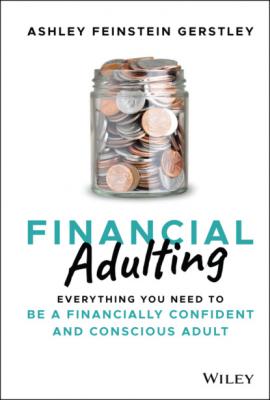Financial Adulting. Ashley Feinstein Gerstley
Читать онлайн.| Название | Financial Adulting |
|---|---|
| Автор произведения | Ashley Feinstein Gerstley |
| Жанр | Личные финансы |
| Серия | |
| Издательство | Личные финансы |
| Год выпуска | 0 |
| isbn | 9781119817314 |
Build a Bigger Coalition
Linda says “we've allowed feminism to be cast as a left-wing issue. The left wing claims it and the right wing disdains it, but among the American public, treating women and men equally is just what decent people do. It's a core centrist value and we should start treating it that way.” She argues that “these issues, issues around capital and the economy, are things that in my experience, speak very strongly to republican, financially conservative women.” She believes we can build a bigger coalition from all political parties.
Equality versus Equity
The distinction between equality and equity is extremely important in personal finance. Dasha describes equality as giving everyone the exact same personal finance resources and saying “I provided you with tools, now it's up to you to use them,” whereas equity is giving people the resources that apply specifically to their experiences and needs, especially those in communities that are impacted by systemic gaps and discrimination.
Dasha explained:
Black women live at the intersection of race and gender so we're always fighting two battles. 81% of Black mothers are the primary breadwinners of their homes.31 That means four out of five Black families depend on the paycheck of a Black woman to survive. The conversation around personal finance will be different for us.
When I first started as a financial educator, I'd hear other educators swear off credit and say “Credit is bad. If you can't afford it now, don't get it.” But this is a very privileged and judgmental perspective. For Black women, and Black people as a whole, credit can be a saving grace because it fills the gap when we're not paid fairly and our families haven't had the opportunity to build wealth. Instead of swearing it off, equity is teaching people how to understand it and leverage it if it's needed.
Because personal finance systems look different for each of us depending on our privilege, race, gender, and sexuality, we need more nuance and perspective in financial education.
Your Education Matters
In talking to so many people, especially women, about their financial lives, I've found a common thread in many of our stories. So many of our financial successes come from someone who gave us a nudge. This might be a colleague who urged us to set up our 401(k), a friend who sat down with us to show us how she budgets, or the colleague who bravely shared what she's getting paid so we could compare.
When we get educated around our money, not only do we lift ourselves and our families up, we can be an example of what's possible and we can give others the nudge they need. We bring others up with us and that has a tremendous impact.
Your Financial Adulting Action Items
Understand that politics and money are inseparable.
Understand the racial and gender wealth gaps – where they come from, how they are perpetuated, and how they currently affect your own personal finances.
Help close the gap. In addition to the resources here, you can learn more in the Financial Adulting toolkit. Build your knowledge, use your voice, and vote for leaders who believe in the changes you do.
Support financial educators (and businesses) who share your values and are women and BIPOC-owned.
Become a financial adult. As you learn and achieve more, you'll bring yourself and others up with you.
As you go through each of the following chapters covering different financial topics, you'll see that equity, privilege, and policy are integral parts of the big picture – no more financial advice in a silo. That's the first step to being a financial adult. First up, your money goals!
Notes
1 1. “CPI Inflation Calculator,” U.S. Bureau of Labor Statistics (July 2009–August 2021), https://www.bls.gov/data/inflation_calculator.htm.
2 2. “Disparities in Wealth by Race and Ethnicity in the 2019 Survey of Consumer Finances,” The Federal Reserve (September 28, 2020), https://www.federalreserve.gov/econres/notes/feds-notes/disparities-in-wealth-by-race-and-ethnicity-in-the-2019-survey-of-consumer-finances-accessible-20200928.htm#fig1.
3 3. Heather McCulloch, “Closing the Women's Wealth Gap” (January 2017), https://womenswealthgap.org/wp-content/uploads/2017/06/Closing-the-Womens-Wealth-Gap-Report-Jan2017.pdf (chart, p. 4). Original source: https://assetfunders.org/wp-content/uploads/Women_Wealth_-Insights_Grantmakers_brief_15.pdf.
4 4. “Moms Equal Pay Day 2021,” Equal Pay Today, http://www.equalpaytoday.org/moms-equal-pay-day-2021.
5 * When I say BS, I mean bullshit.
6 5. “Disparities in Wealth by Race and Ethnicity.”
7 6. Melany De La Cruz-Viesca, Zhenxiang Chen, Paul M. Ong, Darrick Hamilton, William A. Darity Jr., “The Color of Wealth in Los Angeles,” The Federal Reserve Bank of Los Angeles (2016), http://www.aasc.ucla.edu/besol/Color_of_Wealth_Report.pdf (p. 5).
8 7. Mariko Chang, “Lifting as We Climb: Women of Color, Wealth, and America's Future,” Center for Community Economic Development (Spring 2010), https://static1.squarespace.com/static/5c50b84131d4df5265e7392d/t/5c5c7801ec212d4fd499ba39/1549563907681/Lifting_As_We_Climb_InsightCCED_2010.pdf (p. 14).
9 8. Dedrick Asante-Muhammed, Chuck Collins, Josh Hoxie, and Emanuel Neves, “The Ever-Growing Gap,” Institute for Policy Studies (August 2016), https://ips-dc.org/wp-content/uploads/2016/08/The-Ever-Growing-Gap-CFED_IPS-Final-2.pdf.
10 9. “The Homestead Act of 1862,” National Archives (June 2, 2021), https://www.archives.gov/education/lessons/homestead-act#:~:text=President%20Abraham%20Lincoln%20signed%20the,pay%20a%20small%20registration%20fee.
11 10. Ibid.
12 11. Ibid.
